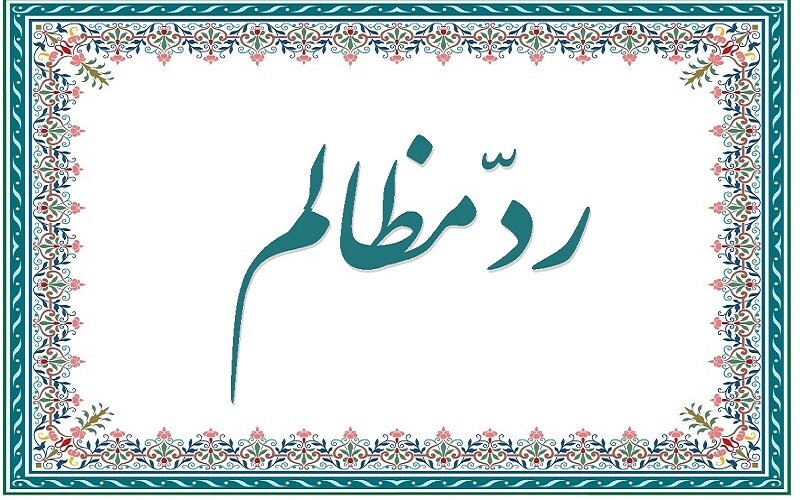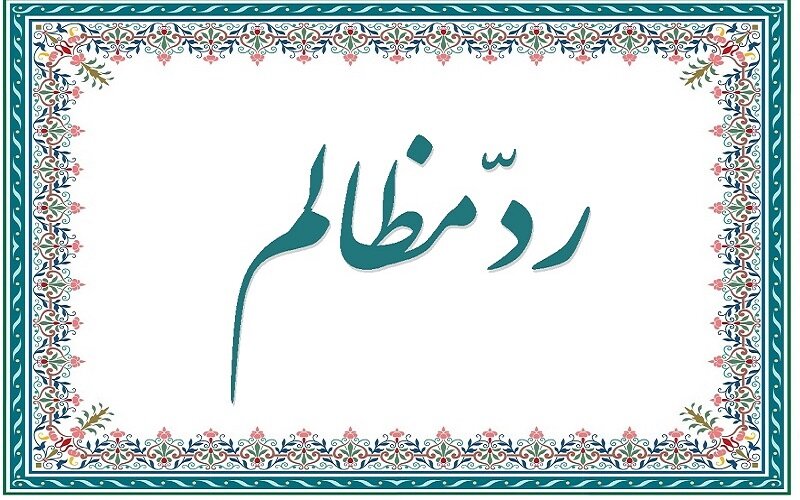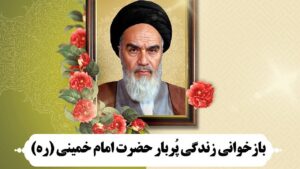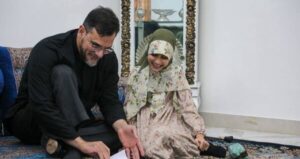
to report Missionary thought and culture baseThe late Sheikh Har Amili, the author of the book “Wasayil-e-Shi’a to study issues of the Shari’ah”, wrote a chapter in this valuable work under the title: “The duty of rejecting injustice to its people and the requirement of repentance from it, if it is impossible.” Far Allah for the Oppressed” has opened.
Terms and conditions of rejecting atrocities:
Abdomen
One of the points that is important to pay attention to in relation to any charity, including rejection of atrocities, is the issue of “requirement of acquisitions”; That is, charity is considered charity when it reaches the poor or his lawyer.
Based on this, abandoning property as a repudiation of injustice is not considered as rejection of injustice, and until it reaches the hands of the poor person or his special or general lawyer (Mujtahid Jame al-Shari’at), it is the responsibility of the person.
Repentance and rejection of atrocities
According to hadiths, repentance is accepted when the repentant removes himself from the “oppressions of Ibadullah”.
Someone says: Serving Imam Baqir? I reached and said: “Why did I die from the time of Hajj until this day? Hazrat remained silent and did not answer. When I repeated my question, Imam Baqir? They said: “No, until you bring it to the whole truth.”
Someone else in the presence of Amir al-Mu’minin? He asked for forgiveness from God, he reprimanded him and introduced six conditions for repentance, one of which is: “To render to the creatures their rights until you meet God, and there is no obligation for you.”
consumption
The consumption of “Rejection of atrocities” is exclusive to the “poor Shiites”; Therefore, it is not permissible to spend it on charity such as building bridges and mosques. Note: The jurists have said that the expiation given to the poor should only be consumed in “food”. Now, we consider it necessary to mention this matter that it is not necessary to comply with such a thing regarding “refusal of atrocities”, but the poor can use the rejection of atrocities in any of his necessary expenses. Don’t consume atrocities in “sin”; Because the Qur’an says: “Don’t help wrongdoing and aggression.”
alimony
A person cannot pay back the injustices to the persons who are obligated to support him (such as his wife, children, and parents); Because it is necessary to pay the poor people, and since the alimony of the mentioned people is obligatory on humans, they will no longer be poor.
Cases
There are many cases of “rejection of atrocities”, we mention some of them:
1- Found property (loqatah) whose owner does not know and despairs of finding it.
2- Money that he borrowed and forgot about the creditor or does not have access to him.
3- What a person finds among his property and is certain that it is not his property.
4- Money that someone has usurped and whose owner cannot be found.
5- A person has been in the service of “Zalama” and has taken property from people on his orders, but he cannot find their owners.
6- A goldsmith who knows that the pieces of gold and silver left at the workplace belong to the people and their owners are not satisfied, but he does not know them, and the same is true of all the masters of the professions that some of the property remains with them and has value and its owners do not know In this case, if at the beginning, there is a condition that they forgive, there is no need to reject the atrocities.
7- Money left by visitors or guests at work or home, etc., and its owner is unknown.
What we have mentioned was for examples, otherwise there are many examples of rejecting atrocities.
Succession of heirs
Refusal of injustice is considered in a place where the original owner or his heirs are not known or access to them is not possible. Accordingly, if the original owner has passed away, but his heirs are alive and access to them is possible, it is necessary to give that property to the heirs. pay slowly and it is not time to reject the atrocities.
Sayyid and Ghirsid
Regarding almsgiving (in general), if the giver of almsgiving is unsatisfied and the recipient is a syed, there are two accidental issues and one conflicting issue.
But two incidental issues:
A) Zakat
Regarding zakat, all jurists are of the opinion that non-sayyid cannot pay zakat (both wealth and fitrah) to sayyid.
b) Recommended charity
The belief of all scholars of jurisprudence is based on the fact that non-sayyid can give mustahab alms to sayyid, provided that it is not accompanied by insult.
But the issue of dispute regarding charity is obligatory non-zakat (such as rejection of injustice and expiation) that some jurists do not consider it permissible to pay such charity from a non-Sayyid to a Sayyid, while others allow it.
Therefore, it is necessary to be careful in this field, and if the payer of the rejection of atrocities is not a Sayyid, he should not pay it to the Sayyid, or he should refer to his own reference treatise and get the assignment.
The permission of Mujtahid Jame al-Sharayat
One of the points of the topic of “refusal of atrocities” is that the “permission of the comprehensive mujtahid” is necessary for this matter; Because rejecting injustice is considered as taking possession of the property of the “unknown owner” and while no one can take possession of the property of the unknown owner; Except for Mujtahid Jame al-Sharayat, who has “province” in this field. Therefore, it is necessary to pay the rejection of atrocities to the Mujtahid Jame al-Sharai’t or give it to the poor with his permission.
Note on the law
The subject of “refusal of atrocities” is an exception to one of these two jurisprudential laws:
A) There is no charity except in the property.
b) Necessity of authorization of the proxy in the validity of the proxy;
Because if it is assumed that the money paid, as a repudiation of injustice, is from the property of the original owner, it will be an exception to the first law, and if it is assumed that the donor is from his own property, then it will be an exception to the second law.
The intention of proximity
Imam Kazim (a.s.) said in a hadith: “There is no charity except that which is done by the face of Allah and its reward.”; Therefore, the condition of the validity of any charity, including “rejecting injustice”, is “the intention to draw closer to God”, otherwise the charity will not be fulfilled.
Types of mixing halal with haram
In jurisprudential books, the mixing of halal and haram property is divided into three categories, one of which is the so-called “refusal of the unjust”; Now let’s check them:
1- He knows the owner of the property; In this case, he must pay the property to its owner (not to another person); The ultimate thing is that if the amount owed is known, he should pay the same amount, and if the amount is not known, he should compromise with him.
2- He does not know the owner of the property; But he knows the amount of debt, in this case, it must be paid. It means to give charity on behalf of the property owner.
3- He does not know the owner of the property and the amount of debt is not known. In this case, “one-fifth” of the property must be paid to Marja Taqlid as “Khums”, then he can seize the rest of the property.
Note: If he gives khums of halal wealth mixed with haram, and then finds out that the amount of haram is more than khums, if the amount is known to be large, he should give charity on behalf of the owner of the amount that he knows was more than khums, as a precaution.
Find the owner
If, after paying charity, the owner of the property is found and demands his property, it is obligatory on the person who rejected the injustice to pay his property.
childhood
There is no difference between a child and an adult in terms of status and including guarantees; So, if a person wastes money from someone else during his childhood, the guarantee and debt will not be cleared from him. Based on this, a person who has reached the level of maturity and knows that he wasted property from others during his childhood, it is necessary to pay attention to what we mentioned in the above lines (the three types mentioned).
Obligation and preference
Rejection of atrocities is divided into two types: obligatory and mustahab; Because if a person is certain of the right to reject the atrocities, it will be obligatory to reject the atrocities, but if he is not sure about this but gives a possibility, it is recommended for him to pay the rejection of the atrocities; Because in this case, he is careful “and caution is good for the whole situation”.
The necessity of a will
If a person sees the signs of death in himself, it is necessary to make a will regarding the rights of God and the rights of people, including “rejecting injustice” so that he does not die indebted to God and people.
All sources of taqlid have written: When the signs of death appear for a person, it is obligatory on him:
1- Return the trusts that are with him to their owners.
2- To fulfill God’s rights; For example, he performed prayers, fasting, penances, etc.
3- To fulfill the rights of the people; For example, he should pay the loans that are due and that he can afford.
4- If it is not possible for him to do the said things himself, he should make a will so that they do it for him, in addition, he should present two fair witnesses and confess to them the said debts and rights so that the heirs cannot deny them later; Especially about the loans, the damages he caused to others and the khums and zakat that he was owed.
5- In the case of physical duties such as prayer and fasting, the bequeather should hire someone to perform them on his behalf, of course, this ruling is in the case that he does not have an older son to do it on his behalf, or he has one, but he is not sure of doing it, or He considers his action invalid.
The death of people and rejection of atrocities
Regarding the relationship between the death of a person and the rejection of atrocities on behalf of the deceased, there are three categories that should be considered:
1- It is certain that the amount of the death penalty has been assigned to the deceased’s property, in this case, the same amount should be taken from the original property and paid as the death penalty. In the aforementioned ruling, it does not matter whether the deceased made a will or not.
2- The deceased himself has bequeathed that a certain amount of his property be paid as a definite and certain payment of injustices, in this case, the injustices will be paid from the original of his property.
Note: In the two mentioned cases, there is no difference between whether the heirs of the deceased are willing to pay the reparations or not, and there is no difference between the amount of reparations is equal to one-third of the deceased’s estate or more; Because rejecting atrocities is definitely considered a form of “religion” and religion precedes “inheritance”. The Holy Qur’an says: “Whoever makes a will after a bequest, bequeaths it or religion.”
3- There is no certainty of the responsibility of the deceased to pay for the atrocities, in this case it is forbidden to pay for the atrocities; because after his death, the property of the deceased will belong to all the heirs; Yes, if all the heirs agree to pay for the atrocities, there will be no problem; Because in this case, they take possession of their property “and the people are in control of their property”.
non property
What we mentioned so far was about “rejecting financial atrocities”, now it is appropriate to say something about rejecting non-financial atrocities.
Non-financial atrocities are about the loss of any right that is considered as the “human right” in the validity of Aqla, such as:
1- Has taken another person’s reputation by words, gestures, satire or in any other way.
2- He has absented himself from another and revealed his secret fault.
3- He interfered in someone’s life unnecessarily.
4- It has prevented him from resting.
5- It has caused pollution (both noise, health, etc.) and has caused people to suffer.
6- He has published a book or an article written by someone else under his own name.
7- In public places, he occupied a place that was another priority.
And… the way out of such injustices is that if it is possible to obtain the consent of the owner of the right and it does not cause sedition, he should seek a solution and free himself from the right of the people, and if it is not possible or it causes sedition, for “Rights” to ask for forgiveness.
May Allah remove all of us from the oppression of worshipers.
In the end, it is appropriate to quote the prayer that Sayyid Ibn Taaws (589-664) from Imam Sadiq? In the precious book “Iqbal al-Amal” regarding the departure from “Mazalim Ibad” it is mentioned that we should raise:
“… Allah and the Prophet (peace be upon him) The Prophet (peace be upon him) and the Prophet (peace be upon him) or the Prophet (peace be upon him) َ Oh God, giver and benevolent, and do not take me out of this world, and there is no sin in my neck except forgiveness May you be kind and merciful, O Most Merciful.”
منبع: www.khabaronline.ir




